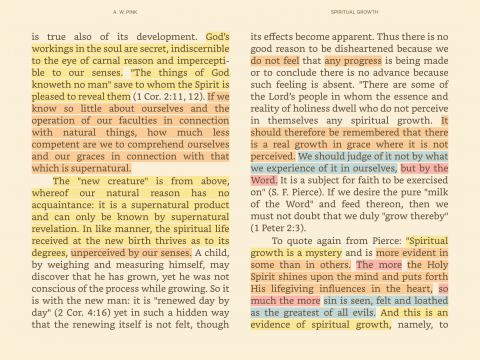
For precept must be upon precept, precept upon precept; line upon line, line upon line; here a little and there a little.
Isa. 28:10
Our spiritual growth is produced and promoted by the gracious, wise, patient, and faithful operations of the Holy Spirit. No real Christian is ever satisfied with his growth: far from it, for he is painfully conscious of what little progress he has made and how far short of God’s standard he comes.
The vital principle within it is drawn out unto the sun above, attracted by its rays. Though rooted in the earth its nature is to move toward heaven, slowly but surely lifting its head higher and higher. Thus the growth of a tree is ascertained first and may be measured by its upward progress. And does not the analogy hold good in the spiritual realm? is it not thus with the saint? It is the very nature of that new life which he received at regeneration to turn unto its Giver. The first evidence of that life being imparted to the soul is his seeking unto God in Christ. The need of Him is now felt; His suitability is now perceived, and the heart is drawn out unto Him. As yet he may not be able intelligently to articulate the newborn desire in his heart, yet if that desire were put into Scriptural language it would be expressed thus: “As the hart panteth after the waterbrooks, so panteth my soul after thee, O God” (Ps. 42:1), for none else can now satisfy the newly-created thirst within him. In view of the last two chapters there is less need for us to develop this at length.
The higher the top of a tree reaches toward heaven the further from the earth does it move. Ponder that, my reader, for it is a parable in action. Before regeneration your heart was wholly set upon this world and what it provides for its devotees; but when your heart was super-naturally illumined and you beheld “the light of the knowledge of the glory of God in the face of Jesus Christ” (2 Cor. 4:6) the spell was broken, and you could no longer be content with the perishing baubles which hitherto enthralled you. True, the “flesh” may still lust after them, and if you yield to their solicitations your peace and joy will he dampened, and for a season disappointment and sorrow will be your portion; yet there is that within you now that is no longer contented with childish toys and that seeks after the One who bestowed that new nature. It is the normal thing for that spiritual life to grow, and if it does not, you are living far below your privileges. Such upward growth will consist of stronger yearnings after God, more constant and frequent seekings after Him, a closer acquaintance with Him, a warmer love for Him, more intimate communion with Him, a fuller conformity to Him, and a deeper joy in Him.
As the believer grows Godward His glory becomes more and more his concern and the pleasing of Him in all his ways the main business of his life, so that he performs even common duties with an eye increasingly upon Him. Our personal and experimental knowledge of God increases by our “following on” to know Him (Hos. 6:3), for the more we seek to do His will the better we come to understand (John 7:17) and admire the same. Truth is then sealed on the mind, the understanding is more quickened in the fear of the Lord, and our relish of God’s ways is intensified. Holy Acts become holy habits and what was at first difficult and irksome becomes easy and pleasant. The more we “exercise ourselves unto godliness” (1 Tim, 4:7) the more we are admitted into its secrets.
From a dim perception of spiritual mysteries we gradually attain unto “all riches of full assurance of understanding” (Col. 2:2) of them. The more we are weaned from the world, the keener relish do we have for spiritual things and the sweeter do they become to our taste. As God is better known, our love for Him increases and we set a higher esteem on Him, a greater delight in Him is experienced and more and more the heart pants after a full fruition of Him in glory.
Not that the believer ever reaches a point where he is satisfied with his knowledge of God or pleased with his love for Him. There could be no more lamentable proof of spiritual deadness and fatal self-deception than a self-complacent view of our love for God. On the other hand, equally unwarrantable is it to conclude we are not the children of God at all because our love for Him is so feeble and faulty. It is not the love of a natural son for his father which constitutes him his child, though filial love is the proper effect of that relationship. An exalted conception of the character of the parent and of the sacredness of the relationship will render an affectionate child dissatisfied with himself and cause him to declare “I reproach myself daily that I love my father so little, and I can never repay him as I ought.” That would be the language of filial relation. Yet he would not be warranted in arguing, Because I do not love him as I ought, I cannot be his child; or because I love him so little, I question very much if he loves me at all.” Then why reason thus in connection with our heavenly Father! Summing up this aspect we may say that, the upward growth of a believer is expressed by his heavenly mindedness and the measure in which his affections are set upon things above.
A.W. Pink. Spiritual Growth.



